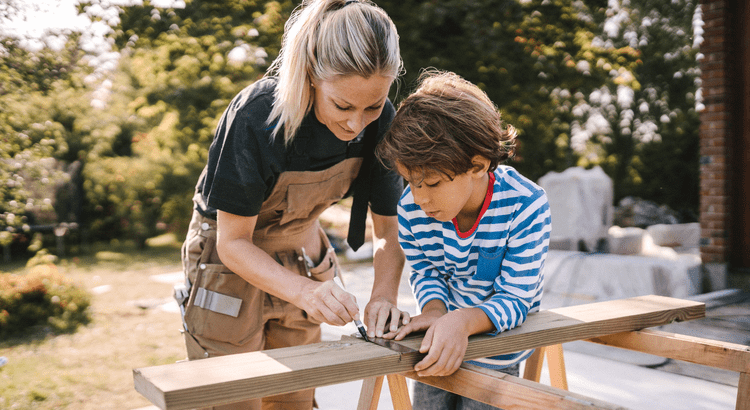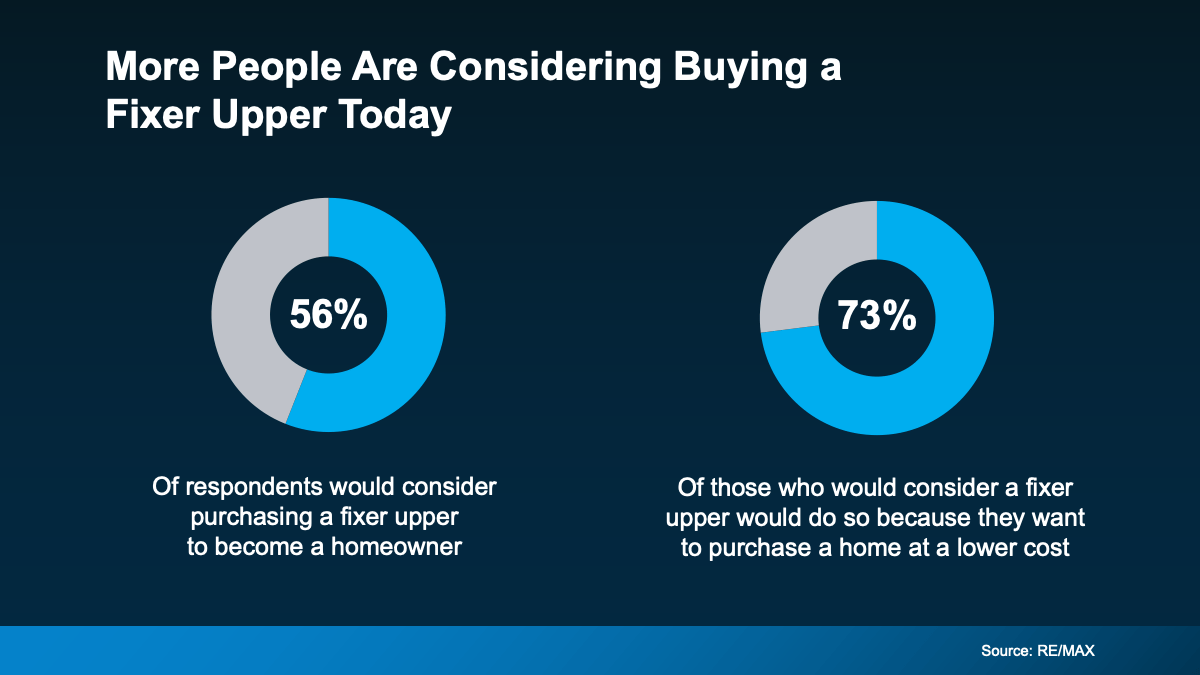
Buying a Fixer Upper: Your Path to Affordable Homeownership
In today’s market, finding a home within budget can feel like a daunting task. With prices up and competition fierce, it's easy to feel that homeownership is just out of reach. But if you're open to a bit of a project, there’s a path that could help you step into homeownership at a more affordable price point—a fixer upper. Here, we’ll explore how buying a fixer-upper home might be your ideal solution and offer tips for successfully navigating the journey.
What Is a Fixer Upper?
A fixer upper is a property that needs some TLC. It’s a livable home, but it might require a range of updates—anything from new flooring and a fresh coat of paint to more substantial repairs like a new roof or updated electrical and plumbing systems. For many first-time buyers, especially those priced out of move-in-ready homes, fixer-uppers offer an attractive, affordable alternative.
The savings are significant, too. According to a study from StorageCafe, fixer-uppers typically cost about 29% less than comparable move-in-ready homes in the same market. That discount can make a real difference, especially for buyers on a tight budget. In fact, more buyers are considering fixer-uppers as a viable option, willing to trade a little sweat equity for the chance to own a home.

Why a Fixer Upper Could Be the Perfect Solution
When you buy a fixer-upper, you're not only buying a property at a lower price; you’re also buying an opportunity. Here’s how investing in a home that needs work can benefit you in the long run:
Build Equity Fast: Every improvement you make increases your home's value, helping you build equity quicker than if you bought a turnkey property. Unlike a new home where value depends on market trends, a fixer-upper’s value grows as you renovate.
Personalization: With a fixer-upper, you have the freedom to customize everything to suit your style and needs. Love an open-concept kitchen? Want to add hardwood floors? You can make design choices tailored to your tastes without settling for someone else's vision.
Lower Initial Costs: By starting with a lower purchase price, you save on the upfront costs. This approach can be especially beneficial if you’re getting into a high-demand area where prices for move-in-ready homes are simply out of reach.
Tips for Buying a Fixer Upper Home
If you’re considering this route, here’s how to make the process as smooth—and successful—as possible:
1. Choose the Right Location
One thing you can’t change about a home is its location, so prioritize this when shopping for a fixer-upper. A home in a desirable or up-and-coming area will hold and grow its value more effectively than one in a less attractive location. Look for neighborhoods with good schools, low crime rates, and nearby amenities like parks, shops, and restaurants.
Pro tip: Research neighborhood trends—areas with increasing property values or planned developments can lead to even higher returns on your investment.
2. Budget for the Unexpected
While fixer-uppers are often cheaper upfront, renovations can add up. It's important to have a realistic budget and a healthy contingency fund to cover unexpected expenses. Surprises like outdated wiring, hidden water damage, or structural issues are common in older homes and can be costly to fix.
A general rule of thumb is to set aside at least 10-15% of your renovation budget as a buffer for these “surprises.” Being financially prepared will keep the process from becoming stressful or overwhelming.
3. Prioritize a Home Inspection
A home inspection is a must with any purchase, but it’s even more critical with a fixer-upper. An inspection will give you insight into the property’s condition, helping you understand what repairs are essential versus what’s merely cosmetic. Work with a qualified inspector who can spot potential red flags, and use their report to plan and budget your renovations.
Think of it this way: The inspection not only informs your decision but can be a powerful negotiating tool, allowing you to potentially lower the price or ask for credits to cover the cost of repairs.
4. Plan and Prioritize Your Renovations
Not all projects are created equal. Some improvements will add immediate value and functionality, while others can wait until you’re more settled. Divide your renovation list into three categories:
Must-Haves: Essential repairs needed to make the home safe and livable, like fixing electrical issues or repairing a leaky roof.
Nice-to-Haves: Upgrades that enhance your quality of life, like adding extra lighting, updating appliances, or improving landscaping.
Dream Features: Luxuries like a spa bathroom, high-end finishes, or a finished basement that you can tackle down the line.
Setting clear priorities helps you stick to your budget and timeline, making it easier to manage the process without feeling overwhelmed.
5. Leverage the Expertise of a Real Estate Agent
A skilled real estate agent can be a tremendous asset when searching for the right fixer-upper. Experienced agents know how to spot homes with real potential and can help you identify ones that align with your vision and budget. They’ll also provide invaluable insights into market trends, helping you avoid overpaying for a home in need of repairs. Plus, they’ll guide you through negotiations, potentially securing you a better deal based on the work required.
Funding Your Fixer-Upper Renovations
While you may have your sights set on a fixer-upper, financing the renovations is another consideration. Luckily, there are loan options specifically designed for this:
FHA 203(k) Loan: This government-backed loan allows you to borrow money for the home purchase and renovations in a single mortgage.
Fannie Mae HomeStyle Renovation Loan: Similar to the FHA 203(k), this loan provides a flexible option to finance repairs and upgrades.
Personal Loans or HELOCs: If you’ve already purchased a home, a home equity line of credit (HELOC) or personal loan can fund your renovation projects, giving you flexibility as you tackle each project.
Final Thoughts: A Path to Your Dream Home
Purchasing a fixer-upper is about seeing the potential where others may not. With the right planning, budgeting, and a bit of creativity, you can transform a property in need of TLC into the home of your dreams. Real estate agents play a key role in this journey, bringing market insights, negotiation expertise, and access to listings that meet your criteria.
In today’s market, where move-in-ready homes can feel out of reach, a fixer-upper is a great way to enter homeownership. You’ll not only save on the initial purchase price but also have the opportunity to build equity, create a space that’s uniquely yours, and step confidently into your future.
Ready to explore the potential of a fixer-upper? Let’s connect and find a home with hidden gems that could be your perfect match. Together, we’ll navigate the journey to help you achieve your homeownership goals. realtor, best agent, real estate, Southlake, Keller, Haslet, home buyer, home seller, home value, Trophy Club, Fort Worth, new home, house, home selling, seller tips, 4wheeltorhomes, 4wheeltor, Crystal Zschirnt, Westlake, Roanoke, Justin, Northlake, Flower Mound, Argyle, Texas
💾 𝗡𝗼𝘄 | 𝗙𝗼𝗹𝗹𝗼𝘄
𝗳𝗼𝗿 𝗠𝗼𝗿𝗲 | 𝗦𝗵𝗮𝗿𝗲
𝘁𝗵𝗲 𝗞𝗻𝗼𝘄𝗹𝗲𝗱𝗴𝗲
𝗖𝗿𝘆𝘀𝘁𝗮𝗹 𝗭𝘀𝗰𝗵𝗶𝗿𝗻𝘁 | 𝗣𝗿𝗲𝗺𝗶𝗲𝗿 𝗔𝗴𝗲𝗻𝘁 | 𝟴𝟭𝟳-𝟴𝟳𝟰-𝟳𝟲𝟳𝟳 | 𝗖𝗭@𝗥𝗲𝗱𝗳𝗶𝗻.𝗰𝗼𝗺
#DFWRealEstate #DFWRedfin #DFWEliteRealty #DFWHomes #4wheeltor #4wheeltorhomes
.jpg)
.jpg)
.jpg)
No comments:
Post a Comment